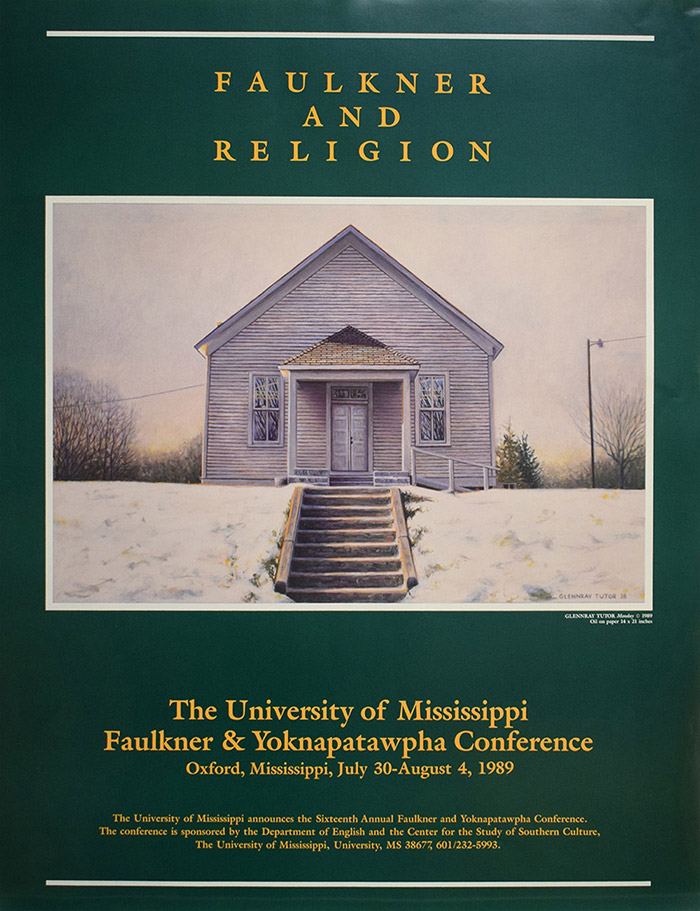
The Dream Deferred: William Faulkner's Metaphysics of Absence
Location
Education Auditorium
Start Date
3-8-1989 9:00 AM
Description
My paper examines William Faulkner’s use of indirection as a way of taking advantage of both the absences inherent in written discourse and the imaginative leaps the reader must make in response to indeterminacies; I believe that Faulkner's narrative technique has a metaphysical significance, revealing an underlying dialectic of skepticism and faith.
Asked once to describe his ideal woman, Faulkner replied that he "couldn't describe her by color of hair, color of eyes, because once she is described, then somehow she vanishes." He felt "that the ideal woman which is in every man's mind is evoked by a word or phrase or the shape of her wrist, her hand. . . . it's best to take the gesture, the shadow of the branch, and let the mind create the tree" (Lion In the Garden 127-128). Faulkner's fiction may be understood as a discourse mediating the terms of this quotation, particularly an elaboration of the semiotic ambivalence: Faulkner's "ideal woman" testifies to a belief in some transcendental signified, some metaphysical "Truth"; however, the fact that this "Truth" can only be approached indirectly, by evocation, implies a clear distrust of the signifier's ability to signify adequately. The solution lies in "the shadow of the branch," i.e., in indirection, evocation, suggestion--all modes of what is generally known as defamiliarization. In short, the familiar is made defamiliar in order that it may be revitalized and seen anew; but inversely, the totally unfamiliar, that which cannot be approached directly--a transcendental signified, for example--must perforce be intimated, suggested, obliquely evoked. This is finite, fallen man's only way of approaching the infinite; it is the approach Faulkner characteristically takes in pursuit of his "dream" of perfection.
Relational Format
Conference Proceeding
Recommended Citation
Marshall, Alexander J. III, "The Dream Deferred: William Faulkner's Metaphysics of Absence" (1989). Faulkner and Yoknapatawpha Conference. 22.
https://egrove.olemiss.edu/fy/1989/schedule/22
The Dream Deferred: William Faulkner's Metaphysics of Absence
Education Auditorium
My paper examines William Faulkner’s use of indirection as a way of taking advantage of both the absences inherent in written discourse and the imaginative leaps the reader must make in response to indeterminacies; I believe that Faulkner's narrative technique has a metaphysical significance, revealing an underlying dialectic of skepticism and faith.
Asked once to describe his ideal woman, Faulkner replied that he "couldn't describe her by color of hair, color of eyes, because once she is described, then somehow she vanishes." He felt "that the ideal woman which is in every man's mind is evoked by a word or phrase or the shape of her wrist, her hand. . . . it's best to take the gesture, the shadow of the branch, and let the mind create the tree" (Lion In the Garden 127-128). Faulkner's fiction may be understood as a discourse mediating the terms of this quotation, particularly an elaboration of the semiotic ambivalence: Faulkner's "ideal woman" testifies to a belief in some transcendental signified, some metaphysical "Truth"; however, the fact that this "Truth" can only be approached indirectly, by evocation, implies a clear distrust of the signifier's ability to signify adequately. The solution lies in "the shadow of the branch," i.e., in indirection, evocation, suggestion--all modes of what is generally known as defamiliarization. In short, the familiar is made defamiliar in order that it may be revitalized and seen anew; but inversely, the totally unfamiliar, that which cannot be approached directly--a transcendental signified, for example--must perforce be intimated, suggested, obliquely evoked. This is finite, fallen man's only way of approaching the infinite; it is the approach Faulkner characteristically takes in pursuit of his "dream" of perfection.

